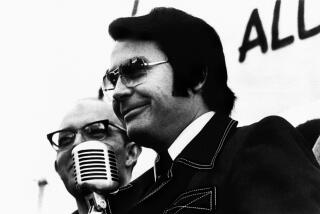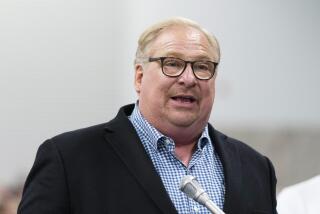As Show Hits Milestone, Schuller Still Preaching Hope and Healing
- Share via
After he was ordained in 1950, the Rev. Robert H. Schuller set out to preach the Gospel. Along the way, he revolutionized religious outreach--and created the fourth-longest-running TV show in history.
Sunday marks the taping of the 1,500th “Hour of Power” program, an occasion that has the Crystal Cathedral founder looking back with wonder on his 28 years on the air.
“No one had any idea back then that it would turn into this,” he said in an interview Thursday.
Schuller’s show--the first weekly, hourlong nationally televised church service--debuted in 1970 and was a seminal event in televangelism, showing the potential for melding media with religion, experts say.
“There were others who came before him, but Schuller took television religion to a new level,” said Stephen Winzenburg, communications professor at Grand View College in Des Moines, Iowa.
“He knew how to integrate church services with the broadcast medium and turn it into a spectacular television event,” said Winzenburg, who has studied religious broadcasters for nearly two decades.
“Before that, they just set up a camera inside a church,” he said. “Schuller knew you had to do more than that. You had to have fantastic settings, great music and powerful preaching.”
After nearly three decades and a host of competitors, “Hour of Power” is the most widely watched religious program in America, with nearly 2 million viewers a week. Schuller’s worldwide audience is estimated at 30 million. The program’s longevity is surpassed by only three other TV shows: “Meet the Press” (1947), “Face the Nation” (1963) and “60 Minutes” (1968).
Looking back, Schuller said he had no inkling of the impact his foray into television would have. He broadcast his first show at the encouragement of a fellow preacher and friend, the Rev. Billy Graham.
“He told me there was no televised church service in California, so we prayed about it,” Schuller said. “Then we went from there.”
That was a monumental step on the path of a man who began his West Coast ministry at a rented drive-in theater.
Aiming His Message at a Broad Audience
Ordained by the Reformed Church in America, Schuller left his native Iowa in 1955 with his wife, Arvella, and set out to start a church in Garden Grove.
From the tar-papered roof of the snack bar at the Orange Drive-In Theater, he delivered six years of Sunday sermons to people in their cars. His open-air ministry taught him valuable lessons that he applied when he began preaching on the air.
When he first went on television, he recalled, in his mind he was “going back to the rooftop of the snack bar, talking to nonbelievers through the glass.”
Though televangelism has generated controversy over the decades, Schuller has never faced sex or money scandals like those that plagued fellow preachers Jimmy Swaggart and Jim Bakker.
“He’s maintained a level of integrity in his ministry that others haven’t,” Winzenburg said. “Probably Billy Graham is the only other one who surpasses Schuller in his public credibility.”
Some observers say Schuller’s enduring appeal lies in his ability to market the Gospel to a broad cross-section of people, both Christians and non-Christians.
“In the old days Swaggart used to take swipes at Muslims and Catholics,” said Benjamin Hubbard, chairman of the department of comparative religion at Cal State Fullerton.
“Even Pat Robertson I find shallow and his charges against feminists and liberal Christians to be intemperate, unfair and inaccurate,” Hubbard said. “Schuller doesn’t do anything like that. That’s just not his style. He preaches a Gospel of hope.”
Schuller acknowledges that the approaches taken by some of his contemporaries are a turn-off.
“There are things that happen in religion that embarrass me--the overtones of bigotry, religious prejudice or arrogance,” he said. “Religion can be done well or not well.”
What Schuller does well, Winzenburg said, is combine positive Gospel and a flair for television, the strengths of his acknowledged mentors Norman Vincent Peale and Bishop Fulton Sheen.
Ultimately, Schuller said, the power and success of his “church of the air” lies in its ability to spread a message of healing to a wide audience.
“I see myself fundamentally as a therapist,” he said. “I want to help people who are hurting. I want to share how I find healing. That’s my first job.”
More to Read
The complete guide to home viewing
Get Screen Gab for everything about the TV shows and streaming movies everyone’s talking about.
You may occasionally receive promotional content from the Los Angeles Times.






